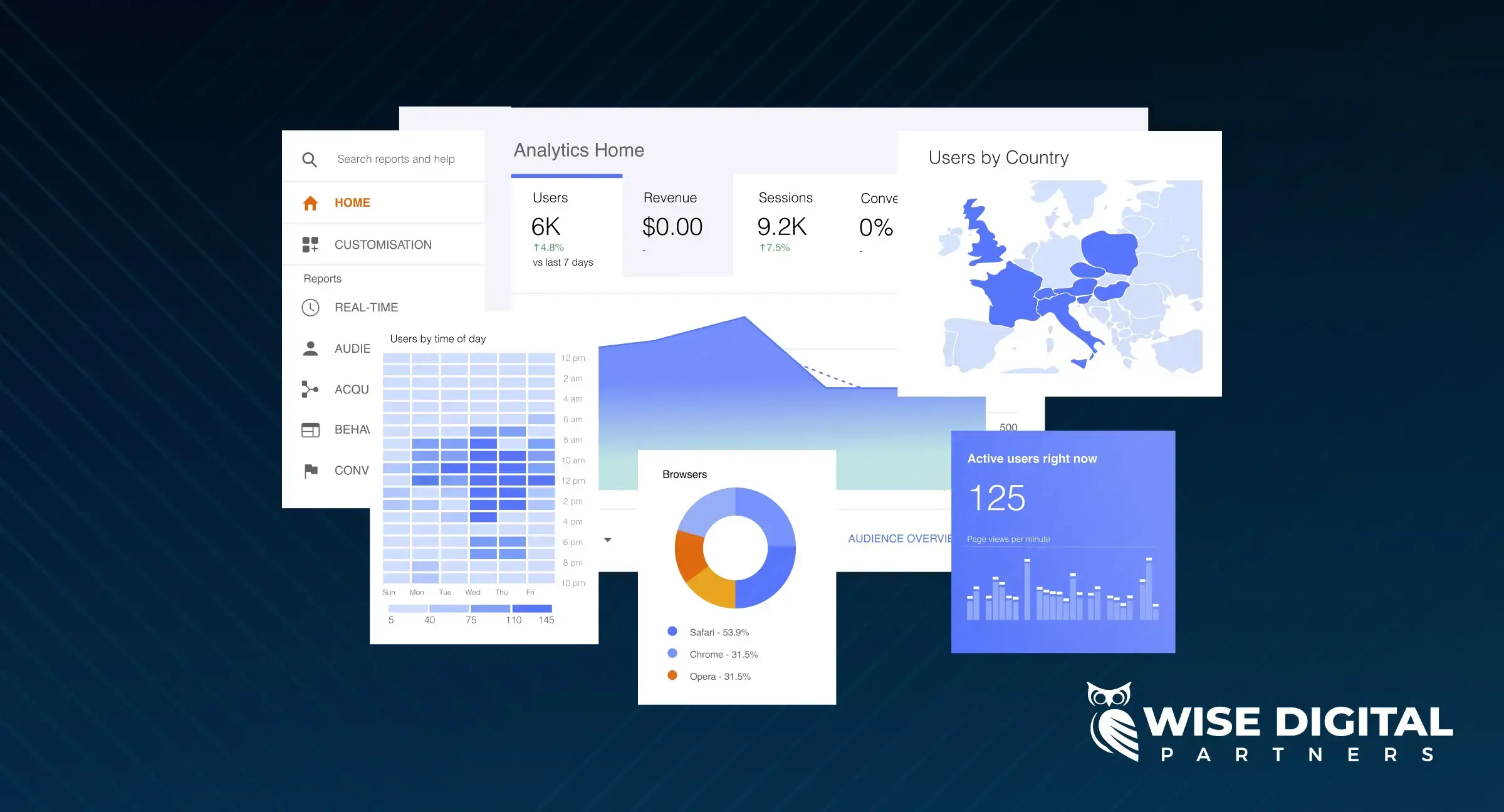It's Time to Get WISE.
Patrick Dillon
CEO
Matthew Hinkle
Director of Accounts
Apply Today
Please fill out the information below. Someone on our team will reach out in 3-5 business days to schedule a call if we see a good fit.
Book Patrick Dillon
Thanks for your interest in booking WISE CEO Patrick Dillon on your podcast! Please complete the form below, and a team member will contact you shortly.

Remove Negative Reviews.
Google Analytics 4 Migration: What Business Owners Should Know

July 19, 2023
- 3 min read

For nearly two decades, Google Analytics has been the go-to solution for business owners who want to track and understand their customers’ needs, preferences, and behaviors.
It’s an essential tool that’s about to change in a big way. Google is retiring the current version of Google Analytics, called Google Universal, as of July 1, 2023.
The replacement is Google Analytics 4 (GA4). There are a host of differences that set this new version apart. But the main one is that unlike Google Universal, which focuses primarily on website traffic, GA4 takes a more holistic approach to tracking user engagement across websites, mobile apps, and other digital channels.
What Does This Mean for Businesses?
Data is king, and businesses that harness its power have a significant advantage over their competitors. GA4 is a powerful new version of Google Analytics that provides business owners valuable insights into their website traffic, user behavior, and marketing performance. Here are some of the benefits:
Improved User Journey Tracking
One of the most significant benefits of GA4 is its ability to track users across multiple devices and platforms, providing you with a more comprehensive view of their behavior. This feature is particularly useful for businesses that have a strong mobile presence or those that use social media to drive traffic to their website.
Deeper Insights into Customer Behavior
With GA4, you can track specific actions your users take, such as clicks, page views, and form submissions, and segment your audience based on various criteria, such as demographics, interests, and behaviors.
Enhanced Data Privacy
Data privacy is a growing concern for many businesses, and GA4 addresses this by offering enhanced data privacy features.
It offers “cookieless” measurement, enabling business owners to gather data while respecting users’ privacy. GA4 also uses behavior and conversion modeling, giving business owners increased insight without compromising user privacy.
Plus, it allows you to configure data retention settings, giving you greater control over how long your data is stored.
The Bottom Line
Ultimately, GA4 allows business owners to gather more robust customer data, which can then be used to optimize your website, improve your marketing campaigns, and increase conversions.
The Key Differences
How does GA4 differ from its predecessor, Google Analytics? Here are three significant changes that Google made.
Tracking Methodology
While Google Universal relies on cookies to track user behavior, GA4 uses an event-based model that captures real-time interactions with your website. This means that GA4 can provide more detailed insights into user behavior, including how users engage with specific elements on your site.
Data Collection
With Google Universal, you must set up custom tracking codes for each page or event you want to track. GA4, on the other hand, automatically tracks all user interactions by default. This makes it easier to get started with GA4 and ensures that you don’t miss any important data points.
Machine Learning
GA4 incorporates machine learning technology to help you gain insights from your data. It can identify trends and predict future user behavior by analyzing user behavior patterns. This can help you optimize your website for better performance and overall user experience.
What Hasn’t Changed?
Aside from the differences between GA4 and Google Universal, there are a couple of similarities worth mentioning.
The Appearance
Both platforms use a comparable interface, so if you’re familiar with Google Universal, you should be fine transitioning to GA4.
Reporting
GA4 and Google Universal share the same data and reporting features. If it can be measured in Universal, it can also be measured in GA4. Plus, you will be able to run the same reports.
While there is a common misconception that GA4 offers more reporting options, many of these features were already available in Google Universal — they were just hidden under different tabs and less evident to users.
Don’t Stress the Migration… WISE Digital Has You Covered
Rest assured, we’ve been watching Google’s updates and have already done the prep work for our clients.
We’ve already set up a GA4 property for each client alongside the existing Universal Analytics property. This allows us to start collecting new data with GA4 while still having access to valuable insights from the past.
And the best part? We’re taking full advantage of the new features in GA4, like tracking user interactions (event-based tracking) and following user journeys across different platforms (cross-platform tracking).
If you have questions about the GA4 migration or analytics in general, don’t hesitate to reach out. Our team is here to provide guidance, always offering our support and expertise.
Share
Subscribe to WISE Insights
Stay ahead of the digital marketing curve and never miss a lucrative trend or insightful tidbit – subscribe to our WISE blog!
Keep Reading
Build. Grow. Soar.
Get WISE about digital marketing with advanced services, industry experts, and cutting-edge tools designed for long-term, sustainable growth.







